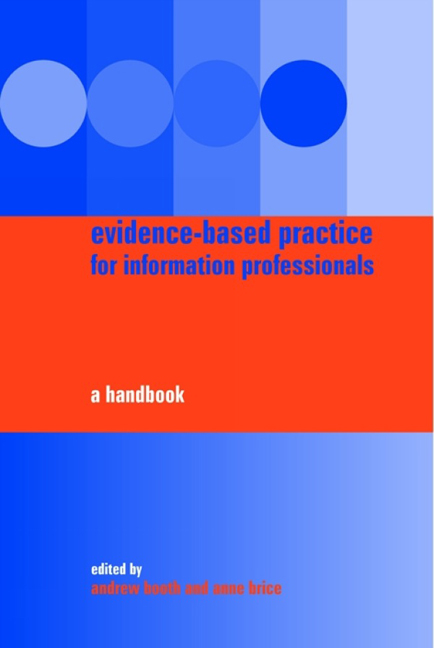Book contents
- Frontmatter
- Contents
- Foreword
- Editors and contributors
- Part 1 The context for evidence-based information practice
- Part 2 Skills and resources for evidence-based information practice
- Part 3 Using the evidence base in practice
- 13 Six domains of evidence-based information practice
- 14 Examining the evidence base for reference services and enquiry work
- Special Topic (A) Provision of a current awareness service for research staff (Guideline)
- 15 The contribution of evidence-based practice to educational activities
- Special Topic (B) How can I train my users? (Evidence Digest)
- 16 An evidence-based approach to collection management
- Special Topic (C) Electronic or paper: how do I manage my journals collection? (Evidence Digest)
- 17 Towards evidence-based management
- Special Topic (D) How do I measure the impact of my service? (Guideline)
- Special Topic (E) Should I charge and, if so, what should I charge for? (Evidence Briefing)
- 18 Evidence-based perspectives on information access and retrieval
- Special Topic (F) What are the characteristics of a good searcher? (Critically Appraised Topic)
- Special Topic (G) Which database, which interface? (Guideline) 251
- 19 Introducing an evidence-based approach to marketing and promotional activities
- Special Topic (H) Determining the information needs of practising nurses postregistration in the UK from 1990 to 2003 (Evidence Digest)
- 20 A future for evidence-based information practice?
- Index
17 - Towards evidence-based management
from Part 3 - Using the evidence base in practice
Published online by Cambridge University Press: 08 June 2018
- Frontmatter
- Contents
- Foreword
- Editors and contributors
- Part 1 The context for evidence-based information practice
- Part 2 Skills and resources for evidence-based information practice
- Part 3 Using the evidence base in practice
- 13 Six domains of evidence-based information practice
- 14 Examining the evidence base for reference services and enquiry work
- Special Topic (A) Provision of a current awareness service for research staff (Guideline)
- 15 The contribution of evidence-based practice to educational activities
- Special Topic (B) How can I train my users? (Evidence Digest)
- 16 An evidence-based approach to collection management
- Special Topic (C) Electronic or paper: how do I manage my journals collection? (Evidence Digest)
- 17 Towards evidence-based management
- Special Topic (D) How do I measure the impact of my service? (Guideline)
- Special Topic (E) Should I charge and, if so, what should I charge for? (Evidence Briefing)
- 18 Evidence-based perspectives on information access and retrieval
- Special Topic (F) What are the characteristics of a good searcher? (Critically Appraised Topic)
- Special Topic (G) Which database, which interface? (Guideline) 251
- 19 Introducing an evidence-based approach to marketing and promotional activities
- Special Topic (H) Determining the information needs of practising nurses postregistration in the UK from 1990 to 2003 (Evidence Digest)
- 20 A future for evidence-based information practice?
- Index
Summary
Introduction
This chapter characterizes management in terms of its main functions before identifying common types of question and approaches used to resolve them. From here the chapter considers sources to yield answers to such questions. Key management studies are identified and assessed together with implications for practice. The chapter concludes by identifying research priorities with most promise for management. This chapter is followed by two special topics examining the evidence relating to the measurement of service impact and charging for services.
What is evidence-based management?
In the fourth of their domains, Management, Crumley and Koufogiannakis (2002) include ‘managing people and resources within an organization’. Stewart (2001) adopts a broad definition of ‘evidence-based management’ as: ‘The conscientious, explicit and judicious use of current best evidence in making decisions’.
Claiming that it is ‘more difficult to practise evidence-based management than evidence-based medicine’ she asserts that if managers were required to search and appraise evidence for themselves, opportunities for evidence-based practice would be very rare indeed. Barriers are more to do with the slim likelihood that managers will acquire skills in searching and appraising the literature than the paucity of management evidence.
Asking the question
Management research is a relatively young field, far less developed in terms of question formulation than healthcare. There tends to be low consensus concerning key research questions in management research. Studies in the field rarely address identical problems, share a research agenda, or more importantly, ask the same questions. As a result the extent to which meta-analysis, or its qualitative equivalent, meta-ethnography, can be used to group and synthesize findings has been questioned within management research. Replication studies are extraordinarily difficult to find within management research. Consequently, management research often addresses questions at a broad, overarching, organizational level rather than examining the causes of particular problems or specific policies (Tranfield et al., 2002).
Finding the evidence
Management, as a domain, simultaneously lies within the information literature and yet subsumes it. Layzell Ward (2002) observes that: ‘One of the surprising aspects of this year's review has been an increase in the quantity and quality of writing about the management of services within the sector. This review contains more citations than before – and still a higher number of interesting items were rejected. This is in contrast to the general literature of management where fewer interesting papers were retrieved’.
- Type
- Chapter
- Information
- Evidence-based Practice for Information ProfessionalsA Handbook, pp. 200 - 209Publisher: FacetPrint publication year: 2004

